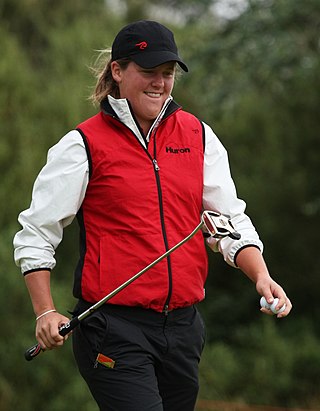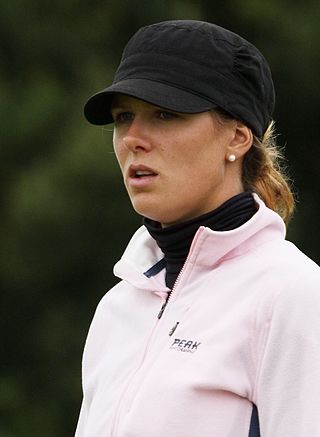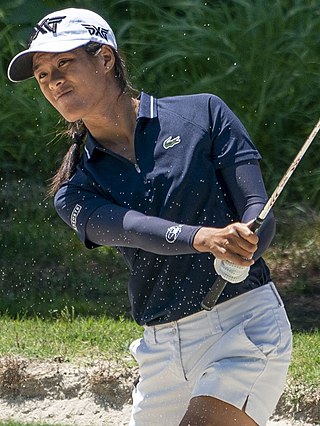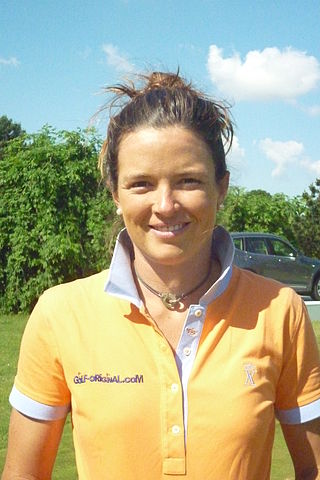
The Ladies Professional Golf Association (LPGA) is an American organization for female golfers. The organization is headquartered at LPGA International in Daytona Beach, Florida, and is best known for running the LPGA Tour, a series of weekly golf tournaments for elite women professional golfers from around the world.
Jennifer Noel Wyatt is a Canadian professional golfer who played on the LPGA Tour.
Wendy Doolan is a former Australian professional golfer who played mainly on the U.S.-based LPGA Tour.

Karin Sjödin is a Swedish professional golfer. She played 10 seasons on the U.S.-based LPGA Tour and was in contention at the 2012 Kraft Nabisco Championship.

Jiyai Shin is a former world No. 1 ranked South Korean professional golfer who primarily plays on the LPGA of Japan Tour. She previously played primarily on the LPGA Tour and the LPGA of Korea Tour (KLPGA). She has broken existing KLPGA records, winning 10 events in 19 starts on the KLPGA Tour in 2007. In 2008, playing only 10 tournaments on the LPGA Tour as a non-member, she won three events, including the Women's British Open and the ADT Championship. She has been ranked No. 1 in the Women's World Golf Rankings for 25 weeks and was the first Asian to be ranked No. 1. With 65 wins worldwide on six different tours, she is the winningest Korean golfer, male or female, of all time.

Lindsey Elizabeth Wright is an Australian professional golfer playing on the LPGA Tour. She earned exempt status for the 2004 LPGA season in 2003, and has been competing full-time on the Tour since.

Marianne Skarpnord is a Norwegian professional golfer playing on the Ladies European Tour.

Minjee Lee is an Australian professional golfer from Perth. She became the number one ranked amateur golfer in February 2014 after winning the Oates Victorian Open, remaining number one until turning professional in September 2014. On 25 July 2021, Lee won her first major championship, the Amundi Evian Championship. On 5 June 2022, she won her second major championship, the U.S. Women's Open.
Su-Hyun Oh is a South Korea-born Australian professional golfer. She became the number one ranked amateur in the world in October 2013.
The participation of transgender people in competitive sports, a traditionally sex-segregated institution, is a controversial issue, particularly the inclusion of transgender women and girls in women's sports.
Lana Lawless is a professional golfer.

Céline Boutier is a French professional golfer who plays on the Ladies European Tour and the LPGA Tour. She has multiple wins on both tours including one major, the 2023 Evian Championship.
Gemma Dryburgh is a Scottish professional golfer.
Sarah Kemp is an Australian professional golfer who has played on the LPGA Tour, Ladies European Tour (LET) and ALPG Tour concurrently for most of her career. She has been runner-up at the Catalonia Ladies Masters, New Zealand Women's Open, Lalla Meryem Cup and Women's Victorian Open.
Gabriela Ruffels is an Australian American former tennis player and current professional golfer. Starting at the age of eight, Ruffels started playing tennis and won twenty one International Tennis Federation doubles events in Europe. She also was the number one ranking Australian junior when she was twelve. After switching from tennis to golf in 2015, Ruffels primarily competed in Australia from 2016 to 2017. In 2018, Ruffels joined the USC Trojans women's golf team at the University of Southern California. With USC, Ruffels appeared at the NCAA Division I Women's Golf Championships from 2018 to 2019 in both the individual and team events.

Joanna Klatten is a French professional golfer who mainly played on the LPGA Tour. She won four tournaments on the ALPG Tour and climbed into the top-100 of the Women's World Golf Rankings in 2014.

Vikki Laing is a Scottish professional golfer who played on the U.S.-based Futures Tour and the Ladies European Tour (LET), finishing 10th in the 2010 LET rankings.
Loraine Lambert is a retired Australian professional golfer who played on the Ladies European Tour and the LPGA Tour. She won the Air France Madame Open in 1997.
Sarah Jane Smith is an Australian professional golfer and LPGA Tour player. She led the 2018 U.S. Women's Open at the halfway point and finished fifth, and was runner-up at the 2014 Kingsmill Championship and the 2016 Lorena Ochoa Invitational.
Hailey Davidson is a Scottish-born American golfer.









